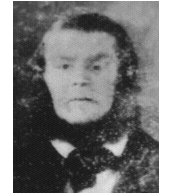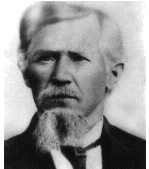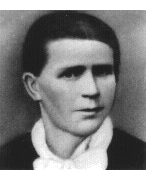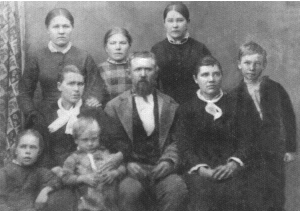 |
||
| JOHN WARREN NORTON | DOROTHY OSBORN NORTON |
NORTON HISTORY
 |
||
| JOHN WARREN NORTON | DOROTHY OSBORN NORTON |
AND
 |
 |
| ISAAC NORTON | SARAH JANE CUMMINGS NORTON |
John Warren Norton was born 12th of May, 1810, in Franklin, Tennessee to William David Norton and Esther James Norton and Dorothy Osborn was born about 1812, somewhere in Tennessee, to Jesse Osborn and Dorothy James Osborn. John and Dorothy's son and our progenitor, Isaac Norton, was born 24th of January, 1837, Shelby County, Tennessee, in the midst of a religious revival. The early 1830's history notes that there was such an unrest among the various religious groups that bitterness and almost hatred grew among them. The various ministers sought to increase their "fold". This unrest was apparent in the lives of each individual going hither and thither, knowing not for what they were seeking. The Norton family was caught up in this spirit of confusion, listening and searching for teachings that could answer the many questions confronting them. All denominations proclaimed that they were the right church, but with doctrines so different from the other, how could they all be right. The Nortons listened and prayed and discussed the doctrines, way into the early hours of morning.
When Isaac was but four years old, his parents came in contact with the Mormon Missionaries in the State of Tennessee, where they were making their home. They listened and prayed. They were ridiculed by their family for even listening to such doctrine. They tried to turn away, but were prompted to continue to investigate this strange and powerful message. The Mormon Missionaries were being tarred and feathered by local residents; they were flogged and run out of town and some were even put to death and yet the Nortons felt the urgency to learn more. On August 12th, 1840, John Warren Norton entered into the waters of baptism and soon after, his wife, Dorothy Osborn Norton accepted the gospel, taught by the Mormon Missionaries and soon, persecutions from their friends and relatives became almost unbearable. About this time, the family consisting of 5 children, William David, born 2nd of May,1832; Jacob Wesley, born 14th of November, 1833; Caroline Chloe, born 6th of September, 1836; Isaac, born 24th of January, 1837; and Martha Ann, 28th of September, 1840, moved to Tippah County, Mississippi. Here, their last two children were born, John Alford, 18th of December, 1842; and Parley King, February, 1845. Here, they found a group of "Saints," as the Mormons called themselves. In the early part of 1846, the Saints were preparing to move to Nauvoo, Hancock County, Illinois, to join the others who had accepted this new religion and the Nortons began to make preparations to go with them. Their belongings were meager, but they packed them into a covered wagon, bid farewell, and with their small family of seven children they wended their way toward Nauvoo, Illinois. As we study and look back into history, it doesn't take much imagination to visualize the strength and courage of those brave pioneers who crossed the plains, driven from their homes, rejected by their loved ones, hated by their neighbors.
The Norton family arrived in Nauvoo sometime in the early part of 1846. At this time, Parley King was very young and Dorothy had not regained her strength and the strain of the move left her weak and failing. They arrived in Nauvoo during the heat of persecution. The Prophet, Joseph Smith and his brother Hyram had already been martyred on the 27th of June, 1844, but this did not stop the persecution and it did not help Dorothy to get on her feet. She tried her very best to care for her family and give them the things they needed under such circumstances, but she continued to fail in health. It was impossible for a member of the church to live in peace in and around Nauvoo, so the family crossed the Mississippi River into Lee County, Iowa. Just where in Lee County, Iowa, Dorothy became ill and died is not known, but she did pass away 6th of September, 1846. This is after the majority of the Saints had gone onto Mt. Pisgah, Iowa. After his wife's death, John Warren Norton took his motherless children, the youngest, Parley King, being under two years old and Isaac being only 9 years of age, and they traveled on to Mt. Pisgah, where the Mormons had surveyed a town and homes and gardens had been planted. Several families were instructed by Brigham Young to remain at Mt. Pisgah to raise gardens, maintain homes and assist the Saints in their travel west. Several hundred homes had been built and large acres of land had been put under cultivation to sustain the weary Mormon travelers. John Warren tried to keep his young family together, but the circumstances were very troublesome. Isaac says, it was here that his father "farmed them out". He remained somewhat bitter about this, as he said he was never again to enjoy the close association with his brothers and sisters, as a family.
It was here, in Mt.Pisgah, that John Warren Norton met a young widow with a small family, by the name of Martha Ann Covington, widow of Alexander Gray, he, dying in Mt. Pisgah. John married her, sometime probably, in late 1846 or 1847.
Apparently, the family that raised Parley King did not move to Utah, as he died in Iowa, 21st of September, 1866, according to Isaac. It is not known exactly when the Nortons came to Utah. One family history shows that John Warren and Martha Ann Covington Norton brought 13 children to Utah, yet no where in records, is shown that John Warren's first family ever lived with him in Utah. They all have been picked, up living in different parts of Utah, with other families. When John Warren and his wife Martha Ann, arrived in Utah, they first settled in Little Cottonwood , south of Salt Lake and there, the Church records note two children, both from his second marriage, but mentions none of her first family, nor John's first family. Three children were born to John Warren and Martha Ann, but only one lived beyond childhood. There were some personal problems that developed in their marriage, after they came to Utah and their marriage was dissolved. Their daughter states, in her brief history, that her father desired very much to have her mother, Martha Ann, sealed to him for time and eternity and she was determined to be sealed to her first husband, Alexander Gay. This was also, the reason given for the divorce.
Soon after the divorce, John Warren Norton was called on a mission to Australia, for the Church of Jesus Christ of Latter Day Saints. (This is when his first-born, William David, in his history, states that their father deserted them. However, this happened about 1854, which shows that the children of his first marriage were well along in age, where they were self-sufficient and more or less on their own.) John Warren's missionary diary tells of the many trials and tribulations he encountered at the hands of those who chose not to believe the gospel of Jesus Christ. He was tarred and feathered, on various occasions. Notations of letters written from the Australian Mission to the church leadership ( on file in the Church Historian's Office,) mentions the work done by John Warren Norton. Part of his journal is missing, but it gives an insight to this man's faith and courage.
In the late 1850's, John Warren returned from his mission. (William David states that his father was gone 7 years) and in the 1860 Census of Provo, Utah, we find him living in the same house with his son Isaac. On the 14th of October, 1860, Isaac married Sarah James Cummings, daughter of Salisbury Cummings and Sarah Pratt Cummings. For a short time, John Warren enjoyed the association of his first family, in and around Nephi, Juab County, Utah, but duty called him elsewhere. October 17th, 1863, John Warren married a third time, to a widow by the name of Ann Jackson, widow of Zimri Baxter, in Nephi, Utah. Sometime in that same year, a call was sent out by the leaders of the church for people to go to southern Utah, to a section known as Utah's Dixie. They were asking for people who had experience in the cotton industry to go and labor there, as they had found that cotton was a thriving industry in that particular part of the State. Since John Warren had a vast experience in both the growing and processing of cotton, while living in the southern states in his youth, he answered the call and after their marriage, John Warren Norton and Ann Baxter Norton moved to southern Utah. Just one month after their marriage, John Warren caught cold and after a short illness, he passed away, 28th of November, 1863, in Washington County, Utah, (Utah's Dixie).
As stated earlier, Isaac and Sarah Jane Cummings were married on 14th of October, 1860, in Provo, Utah. Two children were born to them in Provo, Sarah Alvira Norton, October 14, 1861, and John Wesley, April 12th, 1863. Life was not easy for them and as a livelihood, it had to be made out of the desert land. He worked as a laborer in any job he could find. The Indians were forever in the background, stealing cattle and horses, killing the lone traveler and harassing the settler. A call from Church Headquarters in Salt Lake to go to Richfield, Sevier County, Utah, to fight Indians came and Isaac answered the call. While living at the fort at Richfield, two more children were born to them, Tobitha Althea, 27th of February, 1864 and Mary Jane, 24th of February, 1867.
Indian troubles began to lessen and Isaac joined his brothers in the vicinity of Nephi, Jaub County, Utah. They homesteaded several acres and planted a large fruit orchard. Several families moved into the area and it was called Nortonville. It was about three miles north of Nephi. Here, the next four children were born, Benjamin Isaac, 26th of February 1869; Augusta Ann, (our progenitor,) 22 February, 1871; Orvilla, 1872, (who died soon after her birth and was buried on what was the farmstead) and William Merriday, 20th of January, 1873. Church meetings and school were held in the various homes, but soon, a one room schoolhouse was built, which was also used for religious meetings. They were an official branch of the Nephi Ward. The Norton brothers sold out to a man from the East and Isaac moved his family to what is now 8th North, at the end of the street. His small cabin still stands as a reminder of the hardship and joys lived by this family. It was in this small cabin, that Dorothy Serilda was born, on the 19th of June, 1875. Isaac raised a large and productive garden and made his living from this and other odd jobs he could obtain. He also used his team and wagon to freight produce for others, which brought in a small income. He is noted in the Census of Nephi as a laborer.
 Front Row:
L to R: Dorothy Serilda Norton, Sarah Cummings Norton, Miles
Lafayette Norton, Isaac Norton, Sarah Alvira Norton, William
Merrida Norton
Front Row:
L to R: Dorothy Serilda Norton, Sarah Cummings Norton, Miles
Lafayette Norton, Isaac Norton, Sarah Alvira Norton, William
Merrida Norton
Back Row: Tobitha Althea Norton, Augusta Ann Norton, Mary Jane Norton
Not Present: Benjamin Isaac Norton, John Wesley Norton
By early Spring, 1880, Isaac had moved his family to Annabella, Sevier County, Utah, just a few miles south of Richfield. He once again went into "truck farming" and drove to Richfield in a wagon to sell his produce. He also worked at odd jobs and hauled timber to sell. Here in Annabella, his last child, Anna Lafayette, was born on the 18th of June, 1880. Later, Isaac moved his family to Cainsville, Wayne County, Utah. Here, he once again took up farming on a small scale, at the foot of a beautiful mountain. It was while here in Cainsville, that their daughter, Augusta Ann, again became reacquainted with Elmer Ames Huntsman. They had attended school in Annabella, and Augusta Ann says in her history, they had their fights and quarrels while attending school together, as all young kids do. Both of their parents had moved to Cainsville, but this time they were old enough to start a courtship. Augusta Ann says, they did their courting over a molasses vat, and she said "I can tell you, one batch was badly burnt." She says she also rode twenty miles on a mule with him, to a dance. They were married by their Bishop, Bishop Henry Giles, in her father's home in Cainsville, on 10th of June, 1891, and they made their home in Cainsville, where two children were born, Evon Wesley Huntsman, 12th of March, 1892 and Oreta, on 16th of January, 1895. Their own written history is included.
Isaac and family were active in church functions and he noted he was director of the Ward Choir. On 15th of September, 1892, after a lingering illness, Sarah Jane Cummings Norton passed away and was buried in the small community cemetery, on a small hill in Cainsville. Cainsville now borders the Capitol Reef National Park area and now only a few families live there. Most of the community is now one ranch, using modern irrigation methods, where once the pioneers suffered with either too much water, or when they needed it the most, very little. Only the silent, deserted church remains of the community, to "sing the praises" of those who labored diligently to build up that part of Zion, as it is referred to by those who lived and loved that small farming community.
In the fall of 1896, Isaac moved back to Annabella with his son-in-law, Elmer Ames Huntsman and his daughter, Augusta Ann Norton Huntsman, to their former home's. Each time Isaac "settled in", he set about with his hobby of gardening. It is not known exactly what Isaac did with his time, except from inserts from his children and grandchildren. From time to time, he made extended visits to all of the homes of his children. Isaac is noted, by one of his granddaughters, as living one time in Green River, Utah and rented his barn to Butch Cassidy and his gang for a night's sleep, as they wandered through Utah Valley. Another Granddaughter noted him as being a "mean old man." To many others of his grandchildren, he was a joy to have around. He was definitely a man of fixed ideas---those he liked, he'd do almost anything for, while those he did not like, they had better stay a "far distance" from his cane. One inspirational story he would tell, was when he was a young boy. He said he had been in charge of the cattle (whether it was the community cattle or family cattle) it's not known, but he said a sudden storm came up and frightened the cattle . He tried in vain to round them up and get them to camp, but being so young and frightened himself, it was an impossible task. He said he felt impressed to pray about the situation and knelt down in the rain and prayed for help. When he finished praying, he said he noticed an elderly man rounding up the cattle. He said the cattle were as calm as was the storm. Not a word was spoken between them, as they headed the cattle towards camp. He said he turned around to thank the old gentleman for his help and there was no one there, then he would say, "I've often wondered if that old gentleman was one of the three Nephites." He said the man had long hair and a white beard. ( This is how Isaac looked in later years, long white hair and a white beard, as he would relate the story to his great grandchildren.)
Several of Isaac's children moved to the Upper Snake River Valley in Idaho, in 1904. Just when Isaac joined them, it is not known, but he visited one or other of his children on extended periods for a long time. One of his Granddaughters tells of him having a "truck garden" in Shelley, Idaho and then, close to their home in Jameston area, which was a small community East of Shelley. He was always well known for his fine vegetables. When Isaac got his first pension check, it was a little over $500.00, back pay and all. He sent his children, who were living in Utah, some of the money for travel expenses to come to Idaho for a family reunion. He gave the remainder of the money to his children in the Idaho area to buy food for the family gathering. The reunion was held in the Jameston LDS Chapel. He had many of these reunions and enjoyed his visits with his family. As he would get his pension checks, he would cash it and then wiggle his pockets and let his great grandchildren hear the money jingle. He felt very independent when those checks arrived. He loved molasses and buttermilk on his oatmeal and tried to get them to participate. He would have them go out in the wintertime and bring in snow, pour molasses over it and said it was ice cream. He found very few participants among them.
Of the last 10 or more of his later years, he spent most of it between his son, Benjamin Norton and daughter, Augusta Ann Norton Huntsman. Both had farms within 1/4 mile of each other, in Woodville, Idaho, which was 3 miles Northwest of Shelley. He loved popcorn and could keep his great grandchildren spellbound, telling his experiences of his participation in the Utah Indian Wars. As too often happens, very little was recorded of his experiences, which should have been done, as it is now forgotten history and many things have been lost. The last few years of Isaac's life, Augusta took care of him, as he became somewhat senile and needed much care. He was living with them when he became ill and passed away, 30th of July, 1930 at the ripe old age of 93. He requested that his Grandson, Evon Wesley Huntsman, spend the last few hours with him, as they had built a close relationship and when the last moments came, he asked him to hold his hands, smiled and then he breathed his last. He was buried in the Shelley, Bingham County, Idaho Cemetery, close to other members of his beloved family.
Researched by his Great Granddaughter.
Alta LaReah Huntsman Toronto from family records and historical documents.